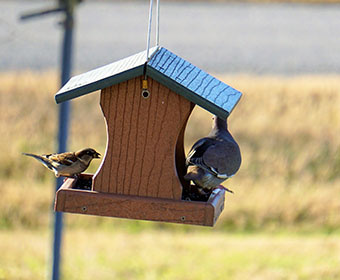
Photo credit: Eres Gomez
(May 29, 2019) -- More than two in three households in the U.S. will feed birds visiting their backyards at some point during the year. However, very little is known about the impact of this additional food on the ecology of birds in our towns and cities.
It’s for this reason that UTSA will launch a project that requires the help of the local community to better understand the impact that feeding birds has on our feathered friends in our backyards.
“We spend billions nationwide on bird feed, but we don’t fully understand the effects,” said Jennifer Smith, assistant professor in the UTSA Department of Environmental Science and Ecology, whose lab will oversee the study. “What is the effect of putting out additional food on the abundance or diversity of birds, or even on their breeding ecology and condition?”
According to members of the UTSA Smith Lab of Avian Ecology, of the studies that have explored effects of feeding, few have considered what the best bird food is for birds. Moreover, most research has been conducted in temperate regions in the northern U.S., Europe, and New Zealand; but there is currently no study that looks at the effects of backyard feeding in Texas or the southern U.S.
One project, known as the San Antonio Backyard Bird Feeding Project and led by Professor Smith and UTSA master’s student Amanda Lamberson, seeks to answer these questions with the help of approximately 40 households that will operate as natural laboratories. San Antonio residents will receive bird supplies and ask to monitor birds in their backyards weekly.
“These ‘citizen scientists’ will not only help address important research questions, but will also engage with nature in their backyards in the process”, said Smith. “We assume that what we buy attracts target species such as northern cardinals that are granivorous. But, there is little research that points to a preference for a type of seed.”
Wild birds will eat different food depending on the time of year and breeding season. Often times in the summer they opt for insects then switch to seeds in the winter. However, it’s unclear if additional nutrients from backyard bird food including seed could impact the weight and overall condition of winged backyard visitors.
“Previous research suggests that garden birds appear to snack on human-provided food and some of it may not be as nutritional as natural food,” said Smith. “Effectively, it could be like we are providing Twinkies.”
The initial phase of the San Antonio Backyard Bird Feeding Project will last for two years and focus on the northside sector of the city. There are plans to expand the project in the future to other areas of the city.
Smith and her team believe their research, with the help of the local community, can serve as a model of how to better understand the effects of urban expansion on the environment.
According to the newest Census figures, San Antonio is the second fastest growing city in the nation, making the impact of this UTSA research a guide to other cities seeking to adopt sustainable practices.
To sign up and become a citizen scientist involved with the San Antonio Backyard Bird Feeding Project, email Amanda Lamberson.
Learn more about Professor Smith’s work.
Celebrate UTSA’s 50th Anniversary and share social media posts about the 50th using the hashtag #UTSA50.
Connect with UTSA online at Facebook, Twitter, YouTube, Instagram and LinkedIn.
UTSA Today is produced by University Communications and Marketing, the official news source of The University of Texas at San Antonio. Send your feedback to news@utsa.edu. Keep up-to-date on UTSA news by visiting UTSA Today. Connect with UTSA online at Facebook, Twitter, Youtube and Instagram.
Enjoy snacks while connecting with Adobe reps and student ambassadors. Download or log into the Adobe Express app to snag swag and unlock exclusive back-to-school templates. It’s a fun, fast way to get creative and start the school year with bold moves.
Central Plaza, Main CampusCelebrate the merger of UTSA and UT Health San Antonio with a pop-up featuring free t-shirts, exclusive swag, and interactive photo opportunities. Open to all students, faculty and staff. Supplies are limited!
Sombrilla Plaza, Main CampusHuddle Against Hunger is a fundraising competition with Texas State that benefits our Roadrunner Pantry. Donations this week will help UTSA earn additional prize monies provided by RBFCU.
In-Person and VirtualJoin UTSA Libraries for an update on federal public access policies and how the library can assist with compliance.
Virtual EventWe invite you to join us for Birds Up! Downtown, an exciting welcome back event designed to connect students with the different departments at the Downtown Campus. Students will have the opportunity to learn about some of the departments on campus, gain access to different resources, and collect some giveaways!
Bill Miller PlazaThere are many citation managers. Which one is right for you? This workshop will explain what a citation manager is and how it can help you organize your citations, insert citations as you write your paper, and generate your bibliography.
Virtual EventPubMed is an essential database for anyone conducting biomedical or health-related research. This workshop will teach attendees how to effectively navigate this free resource and locate peer-reviewed articles using advanced search features, MeSH subject headings, and Boolean operators.
Virtual EventThe University of Texas at San Antonio is dedicated to the advancement of knowledge through research and discovery, teaching and learning, community engagement and public service. As an institution of access and excellence, UTSA embraces multicultural traditions and serves as a center for intellectual and creative resources as well as a catalyst for socioeconomic development and the commercialization of intellectual property - for Texas, the nation and the world.
To be a premier public research university, providing access to educational excellence and preparing citizen leaders for the global environment.
We encourage an environment of dialogue and discovery, where integrity, excellence, respect, collaboration and innovation are fostered.